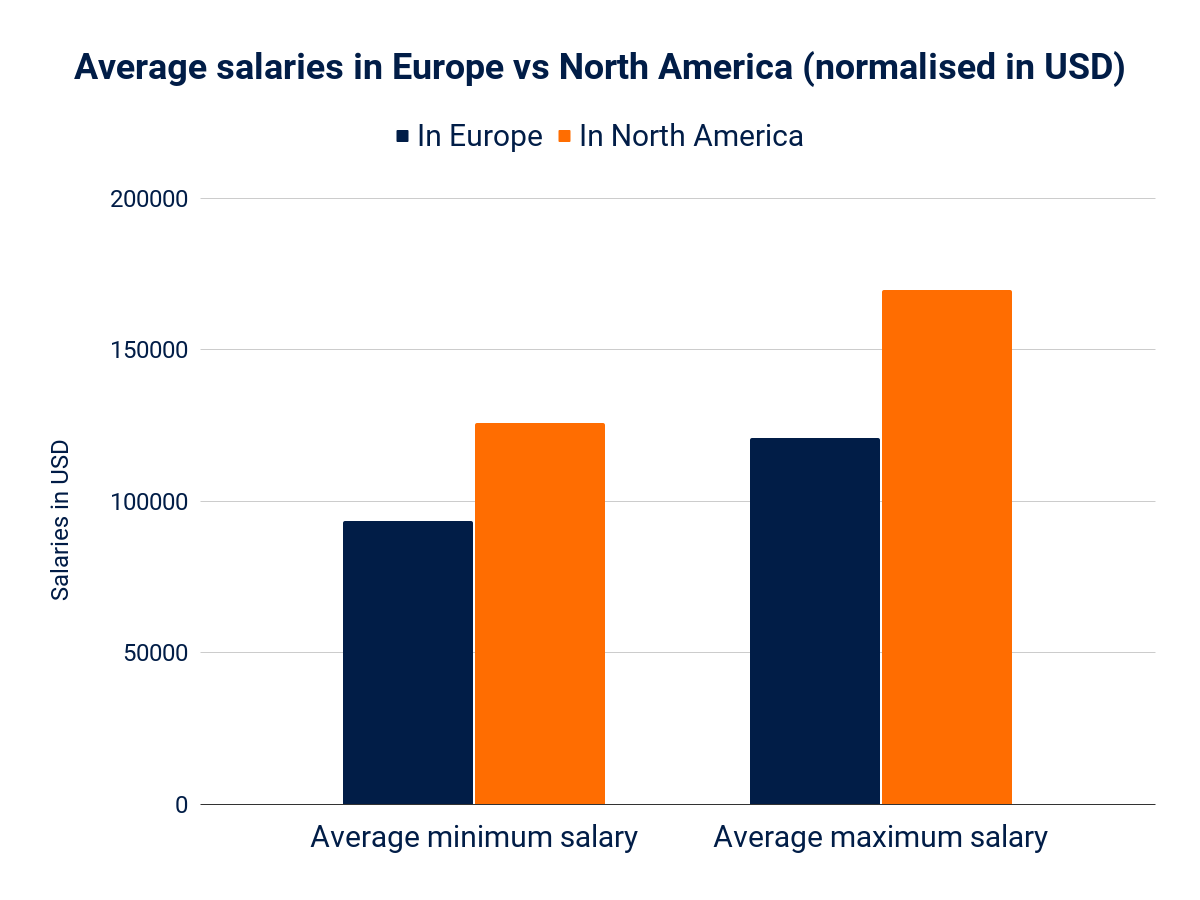Salaries for Kubernetes jobs in Q1 2023
How much are Kubernetes Engineers getting paid?
What's a good salary to expect for a Kubernetes position?
Have the salaries increased with time? And if so, by how much?
The best way to get answers to the above questions (and more) is by using reliable data.
Recently, Kube Careers released their Kubernetes job market trends report for Q1 2023, and we'll be using the dataset to mine a few key patterns when it comes to Kubernetes job salaries.
Before we go ahead, here are a few points to keep in mind with this dataset:
Kube Careers is a Kubernetes job board that only publishes jobs which:
- Have Kubernetes as a requirement and not a nice to have, or a plus.
- Have a clear salary range (this is mandatory).
- Are not sourced from recruitment agencies.
Please keep the above points in mind as we look into the data.
On we go!
What is the average salary for a Kubernetes Engineer in 2023?
It varies with the region!
And thus, we'll analyse the regions separately.
Even though Kube Careers lists job descriptions from around the world, most are from North America and Europe, so we'll analyse these further.
Salary ranges for North American Kubernetes job opportunities

As salaries are often mentioned as a range, e.g. $102, xxx to $115, xxx, we get a minimum and a maximum salary average.
The minimum salary offered in North America, on average, stands at $125,898, while the maximum salary (on average) offered stands at $169,719.
Let's take the median of the above averages.
Doing so, we arrive at an average salary of $147,808, which is almost 14% above the average salary range for a DevOps Engineer (with or without a pre-requisite of Kubernetes experience) in the US.
The highest salary range in Q1 2023 was $245,000-$245,000, which was for a Staff Engineer role.
So, have the salaries increased year-on-year? Or worse, have they decreased?
Let's find out.
North American Kubernetes job salaries across the last year

Average minimum salary:
- In Q1 of 2022, the average salary was $123,126.
- In Q1 of 2023, it was $125,898, almost a 3% increase year-on-year.
- Interestingly, the average minimum salary in Q1 2021 was $116,095, an almost 9% increase over two years.
Average maximum salary:
- The average maximum salary was $166,505 in Q1 of 2022.
- While it was $169,719 in Q1 2023, a 2% increase year-on-year.
- Also, in Q1 2021, the average maximum salary was $158,524, a 7% increase in 2 years.
Highest salary range:
- In Q1 of 2022, the highest salary range was $180,000-$260,000.
- And interestingly, it was for a
Sales Engineerrole. - Compared to Q1 2023, it has seen a 5% increase on average.
In all, the salary ranges in North America have increased by 3-5%, which is similar to the average wage increase in the US, and matches the high CPI inflation in the region.
Salary ranges for European Kubernetes job opportunities

For Europe, the average minimum salary is €87,378, while the maximum salary (on average) is at €113,010.
If we take the median of the above averages, we arrive at an average salary of €100,194.
The highest salary range in Europe for Q1 2023 was €150,862 - €167,025, which was for an Infrastructure Engineer role.
Have the average salaries increased in Europe as well?
Yes, they have.

If we compare the numbers for Q1 2022 and Q1 2023:
- The minimum average salary has increased by almost 5% year-on-year.
- The maximum average salary has increased by 6% year-on-year.
What's comforting here is that these increases are in line with the inflation rates in Europe.
Are Kubernetes Engineers getting paid better in North America than in Europe?
It's highly complicated.
For the sake of analysis, we do a simple Euro to USD conversion of the salary averages.
In that case, we find that the average salary ranges (for Kubernetes jobs) in the US are 25-35% higher than the European averages.

But this can't be conclusive because:
- Europe is a vast, diverse continent consisting of countries with varied costs of living, economies, and technological status.
- The numbers from the Kube Careers report need to be dense to draw such decisive results.
Perhaps we can tackle this question better in the future.
Conclusion
I hope you got a helpful glimpse into the Kubernetes job market.
If you are looking for a Kubernetes job, these stats may help you align your expectations. If you are a recruiter, these might give you a good benchmark.
If you would like to share your perspective on salaries (or anything related to this blog), please feel free to do so.
